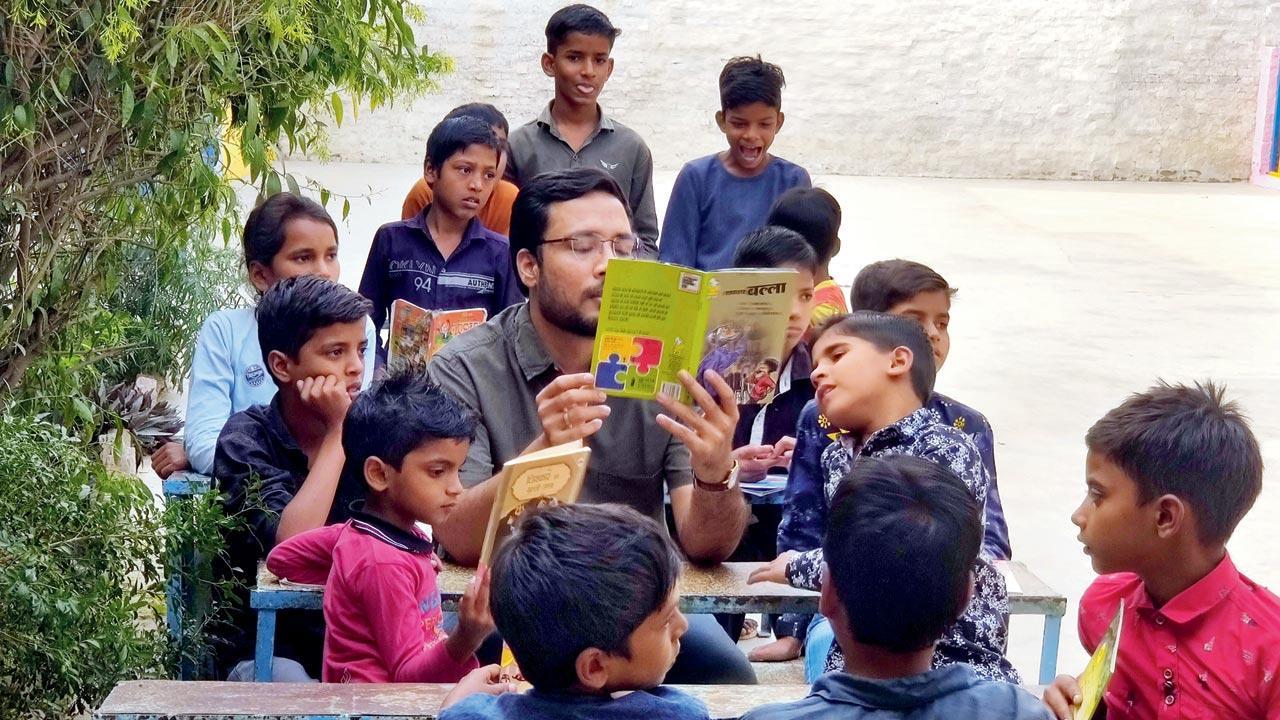Fragmented and undernourished, India’s library ecosystem is the subject of a new draft policy which imagines a future where caste and gender are not barriers and librarians are community leaders

Jatin Lalit established a library in his native Bansa—the only free, community-oriented institution of its kind in Uttar Pradesh’s Hardoi district.
Mere hours before she can sit down with mid-day to talk about India’s library ecosystem, Purnima Rao has been in a meeting with prison officials. The subject of this interaction? Prison inmates’ right to read. Though it has been proven that reading books can assist in their rehabilitation, inmates and undertrials have been woefully ignored and excluded. It may seem like an unusual, if unlikely cause, for people to rally behind, and yet state organisations are working hard to make prison libraries a reality.
The People’s National Library Policy 2024, drafted by the Free Libraries Network (FLN), wants to enable causes like it. A 200+ grassroots libraries-strong network, led by Rao and other library activists across India, it has produced a 65-page document that it aims to place on the desks of a variety of stakeholders, bringing to their notice alarming statistics. Our country has one urban library for every 80,000 people, and one rural library for 11,500 people. This is a world apart from the accepted global norm of one library for 3,000 readers. What can change the dismal ground reality in India? Rao says there’s no magic bullet. “There has to be a people-led movement to demand changes to the ecosystem. A transformation is also needed in the very perception of libraries, which are still seen as study halls where aspirants prepare for entrance tests,” Rao explains.
The draft policy is singular in the way it addresses issues of equitable access, as discrimination on the basis of gender, caste and disability continue to remain barriers. “We’ve been witness to movements in the past—in states such as Assam and Kerala—and comparisons to institutions overseas, but a fundamental question remains unanswered: how do libraries aim to serve those who are left out?” says Rao, “The existential purpose of a library is to build bridges of access for those to whom books, education and knowledge remain inaccessible.” It is through access that issues of growing readership and encouraging critical thinking are addressed, she adds.
For Delhi-based advocate Jatin Lalit, building a library in his native Bansa was a personal, nurtured dream. It is the only free, community-oriented institution of its kind in Uttar Pradesh’s Hardoi district, welcoming 120 readers per day into its premises and boasting of a membership of 1800. But you could walk into the three-year-old library without a membership card too; such is its ethos. “Volunteering at Delhi’s The Community Library Project for three years when I was in college had a huge impact on me. It motivated me to begin a library in my own village, when I had enough resources,” says Jatin, who is FLN’s general secretary.
The draft policy devotes much space to the need for funding and sustainability; after all, without financial support, the acquisition of books and upgradation of facilities is an uphill battle. Aside from government allocations and grants, it highlights strategies like fundraising or even social entrepreneurship—running cafes or bookstores from within library premises.
The institution in Bansa, for example, has been built—brick by brick—on land lent by a local temple where Jatin’s great-grandfather was a sweeper. Its construction, on the other hand, was crowdfunded. “We’ve tried to keep costs low and ensure sustainability… A monthly patron support system, with payments as small as R250, helps take care of recurring expenses. These payments go towards staff salaries and stationery,” says Jatin. An Amazon wish list of books desired by readers is frequently circulated on social media, and orders placed by kind strangers allow new titles to reach the library’s doorstep.
Libraries like the one in Bansa, which caters to 36 villages, are the result of “ad hoc initiatives” by individuals with access and social capital, Jatin admits. Rao is of the opinion that the sprouting of grassroots community libraries is itself a symptom of the breakdown of the public library system. While individual efforts are commendable, they don’t ensure longevity—a factor that the draft policy addresses. “If we don’t devise a framework whereby the establishment and running of libraries is standardised, then such initiatives die out with the people who founded them,” says Rao.
With its eyes to the future, the draft policy envisages an evolved library that moves forward with the times—where readers can use the Internet, and librarians aren’t merely record keepers, but rather community leaders. The authors of the document emphasise that only trained professionals should be put in charge, because the librarian is a make-or-break force. Their role involves engaging with the community, technical skills like cataloguing and maintaining databases, and pedagogical knowledge about curriculum and reading strategies.
“Very often we see that the librarian’s place in the system is bypassed and subverted,” says Rao, “On the surface, it can seem like no one wants to pay a librarian’s wages, but at a deeper level, there seems to be fear about libraries becoming a place for movements, of people’s voices coming together—which a librarian can facilitate.”
7 paise
India’s spend per person on libraries
 Subscribe today by clicking the link and stay updated with the latest news!" Click here!
Subscribe today by clicking the link and stay updated with the latest news!" Click here!








